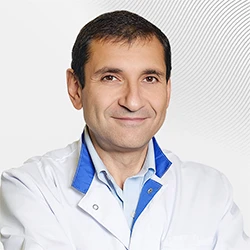Irritable Bowel Syndrome: How the Low-FODMAP Diet helps
In the process of treating patients with IBS, a whole range of measures is used aimed at relieving pain, normalizing stools, and correcting the psycho-emotional state. The patient is offered to undergo a course of drug treatment that helps to get rid of disorders of the microflora of the colon, normalize the contractile function of the intestine, and restore the nervous regulation of the gastrointestinal tract. Recommendations for the treatment of IBS also include lifestyle changes and strict adherence to a diet (the choice of foods depends on the type of IBS and is aimed at eliminating vitamin deficiency, normalizing electrolyte balance, and eliminating micro- and macronutrient deficiencies). Proper diet for IBS is an important condition for improving well—being and further preventing the development of the disease.
According to Bret Lashner, professor of medicine at the Cleveland Clinic (USA), in some patients with IBS, a proper diet can control the symptoms of the disease without the use of drugs. The author of the article in question recommends a special easily digestible diet called the low-FODMAP diet.
What is the low-FODMAP diet
FODMAP is an abbreviation of the term "fermentable oligo-, di-, andmonosaccharides and polyols", which means "fermentable oligo-, di-, and monosaccharides and polyols". In other words, these are carbohydrates that are poorly absorbed and cause fermentation processes in the intestine. Undigested carbohydrates are metabolized by the intestinal flora to form an excess of gas, which causes pain in the intestines, contributes to the development of diarrhea and/or constipation.
Which foods should be limited and what can be substituted
Lactose is found in milk and other dairy products such as cottage cheese, cream cheese, sour cream, and ice cream. Each organism is able to digest a certain amount of lactose, but when consuming lactose-containing foods in greater quantities than the intestines can handle, the result will be increased gas formation and abdominal pain. About half of the population is born with low levels of the enzyme lactase, which metabolizes lactose from food.
What to replace: lactose-free milk, oatmeal/ rice/soy milk as an alternative to cow's milk; lactose-free yogurt. Hard cheeses, brie and camembert are suitable. Preferably olive oil instead of butter.
Fruits contain fructose, which can cause similar problems in patients with IBS. The fructose content is especially high in apples and pears, watermelon, concentrated fruit juices and dried fruits.
What to replace: Eat low-fructose fruits such as bananas, blueberries, strawberries, cranberries, grapes, orange, lemon, lime, kiwi and melon.
Some vegetables cause excessive gas formation and affect intestinal motility. Avoid cruciferous vegetables such as broccoli, cauliflower, and white cabbage, especially sauerkraut. Limit your intake of artichokes, Brussels sprouts, onions, shallots, leeks, and asparagus.
What to replace: eggplant, green beans, celery, carrots, spinach, sweet potatoes, yams, squash and pumpkin. You can add basil, chili pepper, coriander, ginger, lemongrass, marjoram, mint, oregano, parsley, rosemary and thyme.
Legumes (such as beans) are often called "musical dishes" because they contain indigestible carbohydrates and cause gas formation in the intestines. Beans, peas, lentils, and soybeans contain large amounts of these carbohydrates, and IBS patients should avoid them or eat them in very small amounts.
How to replace: rice, oats, millet, quinoa and tapioca (sago). In the absence of celiac disease, you can consume gluten-containing foods (wheat, oats, barley, rye).
Polyols (sweeteners) are sugar substitutes found in sugar—free chewing gum and sweets, including sorbitol (sorbitol), mannitol (mannitol), maltose and xylitol (xylitol).
What to replace: In moderation, of course, but you can use traditional sugar, artificial sweeteners whose names do not end in "–ol" (translator's note: for Russia, these are artificial sweeteners based on aspartame, cyclamate); such honey substitutes, like maple syrup, molasses, etc.
Treatment of irritable bowel syndrome
Sometimes the course of IBS can be successfully controlled with medication, but dietary changes are the first thing we try to draw the patient's attention to. A healthy lifestyle — a low—fat diet, physical exercise, and abstaining from alcohol and cigarettes - make a significant contribution to the success of treatment. For patients who need a special diet, following the low-FODMAP diet will bring significant relief.
The good news is that the low-FODMAP diet is not restrictive. If you study alternative foods carefully, you will find many foods that match your eating habits.
Your doctor may also prescribe medications to eliminate unwanted symptoms of IBS. These can be various medications, including anticholinergic medications that relieve intestinal cramps, as well as antidepressants to reduce stress.
The original article:
Best and Worst Foods for IBS, Low-FODMAP diet may control symptoms (By Bret Lashner, MD).
Why the EMC
The first and only clinic in Russia, created in the image of the world's leading clinics
EMC is a multidisciplinary center offering patients a high level of medical services and a personalized approach
Worldwide recognition and awards
 Learn more
Learn more
Worldwide recognition and awards
 Certificates and licenses
Certificates and licenses
Make an appointment for a consultation
Specify your contacts and we will contact you to clarify the details
Reviews
and new products of the EMC


.webp)



.webp)


.webp)


.webp)


.webp)
.webp)

.webp)

